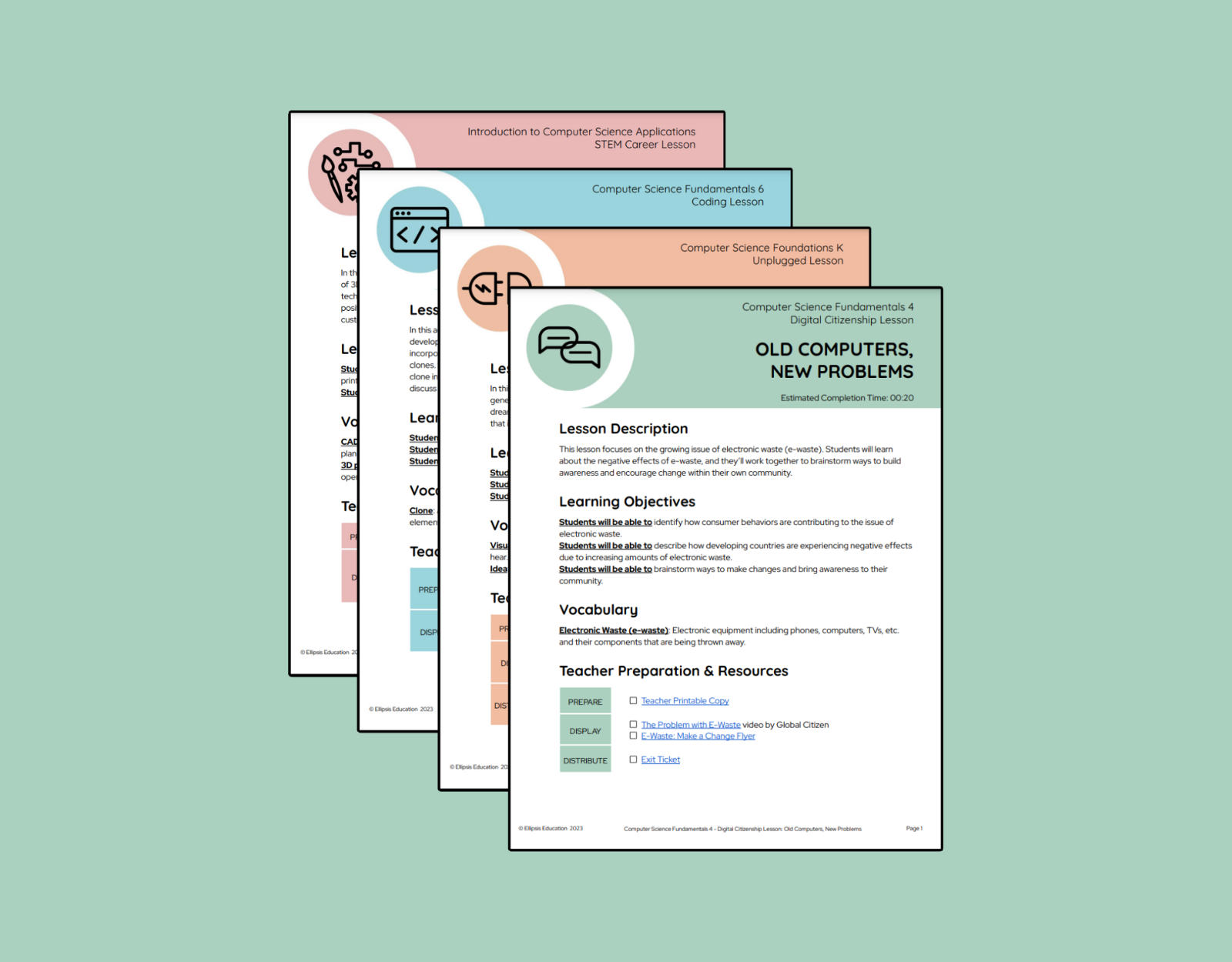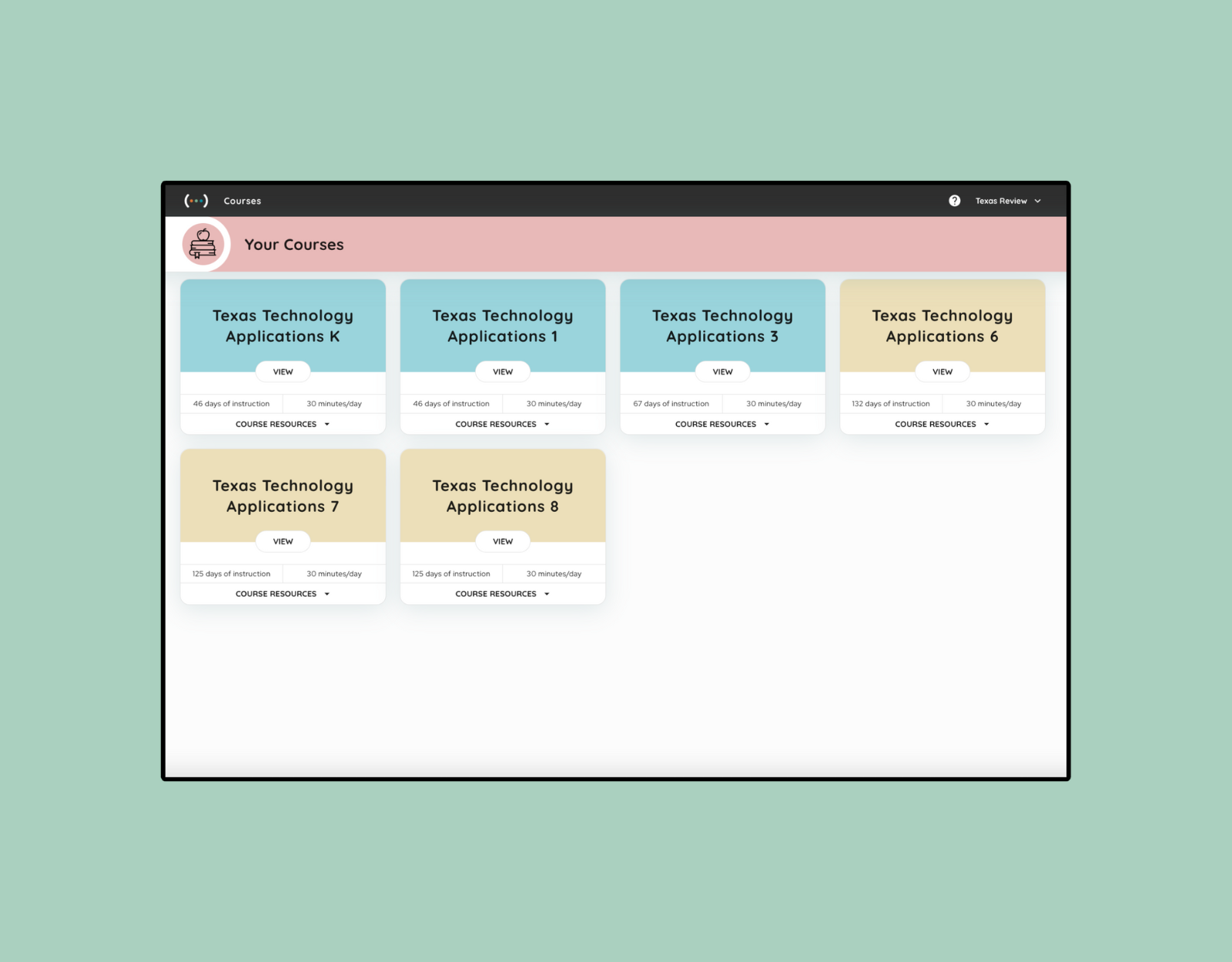TEKS Lesson Plans
Explore lessons that align with the Texas TEKS, one subset of which is the Technology Applications TEKS. If you’re considering TechApps as part of Proc24 next year, Ellipsis Education can help. Our curriculum puts learning in context so a teacher, not a machine, can help students connect the dots.
Why Ellipsis Education?
There are many different programs that support the Technology Applications TEKS.
District partners choose to work with Ellipsis Education because they believe:
K-12 Technology Applications Curriculum
Our K-12 courses have everything you need to get students going: detailed lesson plans (beyond just coding), pacing guides, standards maps, and ongoing support.
Thoughtfully Designed for Texas Educators
With Ellipsis curriculum, teachers put learning in context so students can tie it all together.
TEKS Based Lesson Plans
Explore lessons aligned with the TechApps TEKS in a free trial of Ellipsis Education. In it, you can explore our curriculum specially designed for Texas Educators.
TEKS Lesson Plans
TEKS lesson plans are a tool for educators in the state of Texas to ensure they are meeting the standards set forth by the Texas Education Agency (TEA) in their curriculum.
TEKS, which stands for “Texas Essential Knowledge and Skills,” is a statewide educational initiative that lays out specific guidelines and objectives to be achieved at each grade level and subject area.
These plans serve as a roadmap for teachers, helping them design lessons that address the necessary skills and knowledge, thereby ensuring a consistent learning experience for all students.
One of the key components of TEKS lesson plans is their alignment with TEA TEKS standards. This means that every plan adheres to the requirements established by the agency to provide a comprehensive education to Texas students. The TEA has outlined these standards in various subjects, such as:
- English Language Arts,
- Mathematics,
- Science,
- Social Studies,
- Fine Arts,
- Physical Education,
- Health Education,
- Technology Applications, and –
- English as a Second Language (ESL).
As a result, educators can trust that these resources offer valuable guidance on how to create well-rounded learning experiences that adhere to state guidelines.
In addition to being aligned with TEA TEKS standards, Texas TEKS lesson plans often encompass a variety of instructional strategies aimed at engaging students while addressing diverse learning styles and needs. These approaches might include hands-on activities, group discussions or debates, project-based assignments, or multimedia presentations – all designed around targeted objectives laid out within each standard.
Furthermore, when developing their own lessons based on these templates or incorporating existing ones into their curriculum framework, teachers can also take advantage of additional resources provided by several organizations that focus specifically on creating materials tailored toward Texas educators using TEKS guidelines. For instance, various websites offer repositories of lesson plans compliant with state standards across multiple subjects and grade levels.
Finally, it’s important for educators who utilize Texas TEKS lesson plans not only to stay abreast of any updates or revisions made by the state but also to continually assess their own teaching effectiveness in meeting those expectations. This might involve gathering feedback from colleagues, seeking professional development opportunities, or using assessment data to determine areas where instruction can be refined or adjusted.
TEKS lesson plans are a valuable resource for educators in Texas as they strive to provide their students with a well-rounded education that aligns with state standards. By familiarizing themselves with the TEA TEKS guidelines and utilizing these plans effectively, teachers can work to ensure they are meeting the needs of their students while adhering to the high expectations set forth by the Texas Education Agency.
TEKS Standards
The TEKS standards, an acronym for Texas Essential Knowledge and Skills, are a set of state-mandated educational guidelines that outline the curriculum for students in public schools throughout the state of Texas. Established by the Texas Education Agency (TEA), these comprehensive standards define the expectations for what students should know and be able to do at each grade level in various subjects.
TEKS standards are designed to provide a coherent, rigorous, and focused framework to guide teachers in creating well-rounded and engaging learning experiences for their students.
Among the various subjects covered by the TEKS standards, specific guidelines have been developed for kindergarten education. The kindergarten TEKS set benchmarks that children should achieve by the end of their first year in school. These guidelines encompass multiple areas, such as language arts, math, science, and social studies. Teachers use these standards to develop lesson plans and activities that foster foundational skills for young learners while simultaneously promoting a love of learning.
Focusing on mathematics, the math TEKS outlines critical concepts that kindergarten students must grasp during their early schooling years. At this stage of development, children begin to comprehend fundamental mathematical ideas such as counting, sorting objects into groups based on attributes like size or color, recognizing numerical patterns, comparing quantities using terms like “more” or “less,” and exploring simple addition and subtraction within ten. These core skills provide a strong foundation upon which more advanced mathematical concepts can be built as students progress through subsequent grades.
In addition to laying down foundational numeracy skills, math TEKS also emphasizes problem-solving techniques and helps nurture a student’s ability to reason through mathematical challenges logically. By instilling these crucial problem-solving abilities at an early age as part of the kindergarten curriculum, educators aim to equip youngsters with essential tools that will be invaluable not just in future math classes but across all academic disciplines.
Both kindergarten TEKS standards and math TEKS specifically serve as vital components within Texas’ broader educational framework, providing a strong foundation for young Texans’ academic success. The TEKS standards ensure that students are receiving a consistent, high-quality education across the state while also empowering teachers with the necessary tools and guidance to effectively engage their students in meaningful learning experiences. By setting clear expectations and benchmarks, these comprehensive guidelines help create a unified vision for education in Texas and promote excellence in our schools from kindergarten through high school graduation.
TEKS Resource System
The TEKS Resource System is a comprehensive online platform designed to help educators create, organize, and manage successful lesson plans that align with the Texas Essential Knowledge and Skills (TEKS) standards. These standards define what students should know and be able to do in each subject at every grade level. The main purpose of this system is to ensure that all students acquire the necessary knowledge and skills for success in their academic journey.
One crucial component of creating effective lesson plans is knowing how to list TEKS in lesson plans. This approach ensures that teachers are explicitly addressing the required standards within their instruction. Including TEKS in a lesson plan not only helps maintain compliance with state regulations but also promotes better organization and clarity for educators, students, and administrators when assessing progress and mastery of specific objectives.
A valuable asset available to educators is a TEKS guide, which can serve as a reference tool for understanding the intricate details surrounding each standard. Such guides often provide essential information about the concepts covered under each objective, as well as examples of how they might be incorporated into classroom activities or assessments. Utilizing such resources can greatly benefit teachers by streamlining their planning process while also ensuring they are effectively meeting the needs of their students.
Developing TEKS-based lesson plans can truly enhance an educator’s effectiveness by promoting consistency across curricula and guaranteeing alignment with state-mandated learning objectives. It’s essential for teachers to familiarize themselves with these guidelines so they can successfully incorporate them into their instruction. When it comes to writing a lesson plan that incorporates TEKS standards, it’s important to consider how best to write them into your instructional strategy.
To start, you should clearly identify which specific standard(s) your lesson will address or cover within your plan’s outline. Then, provide adequate support or scaffolding throughout your teaching methods tailored toward meeting those identified objectives.
Lesson plans with TEKS integration should also contain clear connections between the instructional activities and corresponding standards being addressed. This ensures that students engage in learning experiences designed to meet the criteria outlined by the state, increasing their chances of mastering the essential skills and knowledge.
Properly incorporating TEKS standards into lesson plans is an often critical aspect of effective teaching in Texas schools. By using the TEKS Resource System, consulting available guides, and crafting well-organized and aligned lessons, educators can work to create a thriving educational environment that supports student success within the established guidelines. With these tools and strategies at their disposal, teachers can confidently address all relevant objectives while equipping their students with the necessary skills for academic achievement.
Related Links
Ready to Learn More?
See how Technology Applications Curriculum from Ellipsis Education can work in your district. Request a meeting with our accounts team to share your goals and explore our Tech Apps curriculum. If interested, you can also explore our computer science offering for grades 6-8.






